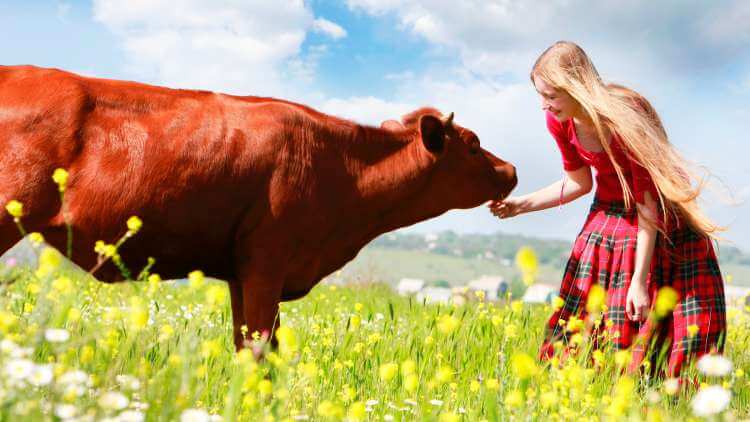It’s World Vegetarian Day! And Here’s 5 Major Health Benefits Of Going Meat-Free
October 1st marks World Vegetarian Day, and to mark the occasion, we thought we’d take a look at some of the many health (and weight loss) benefits associated with living a vegetarian lifestyle.
People follow a vegetarian diet for lots of different reasons, whether that be their ethical stance, environmental concerns or simply to save money. Whether these factors are important to you or not, we’re guessing weight loss is, and the fact is, the universal health benefits of vegetarian living are simply too great to ignore.
It may not come as a surprise that the number of UK vegetarians is sky-rocketing, increasing from half a million in 2016 to 3.5 million in 2018. In the US, that number is even greater, with 7.3 million people choosing to live a meat-free lifestyle in 2018.
Vegetarian diets are supported by large organizations like the World Health Organisation (WHO) and the American Dietetic Association. There are also a host of famous names who follow a meat-free lifestyle, including Ariana Grande, Venus Williams, Bill Clinton, David Haye, Paul McCartney and Ellie Goulding to name a few.
The health benefits of a vegetarian diet
So, why do global bodies, celebs and ordinary folk alike love following a vegetarian lifestyle? And how can it help you? Let’s take a look.
1. It improves heart health
Several large-scale studies have shown that vegetarians are less likely to die from heart disease than meat eaters.
There are several things that contribute to this, including:
- A lower intake of saturated fat
- Lower levels of LDL cholesterol
- A lower salt intake
- A greater intake of fiber
- Lower body fat levels
Vegetarians also tend to have lower blood pressure and better levels of HDL or ‘good’ cholesterol, which contributes to the overall health of the entire cardiovascular system.
2. It helps reverse obesity & promotes healthy weight loss
Numerous research studies have shown that vegetarians tend to have a lower body weight than meat eaters. Those who eat fewer animal products also tend to gain the least weight over their lifetime which indicates that vegetarianism may be a practical solution for long-term weight management.
One study found that vegetarian women weigh an average of 8.6kg (19lbs) less than their meat-eating counterparts, and men weigh 7.3kg (16lbs) less. One of the main reasons for this is the fact that healthy fruits and veggies displace less nutritious alternatives. Eating a fibre-packed diet that’s plant-based simply leaves you feeling fuller, so you’re less inclined to reach for processed snacks or desserts.
Vegetarians also benefit from avoiding the high-fat content of both processed meat products and fatty cuts of meat.
3. It reduces cancer risk
Vegetarians eat a lot more fruit, vegetables, and whole grain carbohydrates which means they consume a lot more fiber. This keeps the digestive system operating at its best so that food is absorbed and excreted quickly.
It’s also true that meat can remain in your stomach for many days in comparison to vegetable matter. The less time food spends in your gut, the less time it has to react and cause free radicals, which damage healthy cells and eventually lead to the growth of cancer.
It’s also becoming well documented that obesity is a major risk factor for cancer, with Cancer Research UK predicting it will become the biggest preventable cause of cancer in UK women by 2043. The weight loss benefits of a vegetarian diet are another way it reduces cancer risks.
But the benefits don’t stop there. The high fruit and veg intake of a meat-free diet also means vegetarians consume high levels of cancer-fighting antioxidants. These help to repair cellular damage and stop cancerous cells from forming in the first place. It’s a natural preventative approach that we can all benefit from by eating our 5 a day, whether we eat meat or not.
4. It decreases the likelihood of diabetes
A high meat intake has been found to be a key risk factor for diabetes, regardless of whether people are overweight or not. Consumption of vegetables, legumes, whole-grain foods, and nuts are also associated with a substantially lower risk of type 2 diabetes.
It’s thought that these foods help to improve glucose sensitivity because they’re slow-digesting, which means they don’t cause large spikes in insulin.
Of course, maintaining a healthy weight is also extremely important when avoiding type 2 diabetes, and by now you’re probably getting the message of how a vegetarian diet helps with that!
5. It may help to reduce the risk of dementia
According to the Alzheimer’s Society, 1 in 6 people over the age of 80 have dementia, with an estimated 46.8 million sufferers worldwide. A recent study found that vegetarians are less likely to develop dementia than meat-eaters, indicating that there may be mental as well as physical health benefits to gain. It’s thought that this risk reduction is due to vegetarians having lower blood pressure and a higher antioxidant intake.
Good for weight loss, good for you!
Regardless of your stance on climate change or animal rights, these health benefits can help us reduce the risk of chronic diseases and you can live a longer, healthier life as a result.
Vegetarianism is no longer reserved for ‘tree hugging hippies’ and is being increasingly adopted by people from all walks of life as a cruelty-free, sustainable, and healthier way to eat.
Tasty alternatives to meat

If you’re interested in adopting a vegetarian diet but are worried you’ll miss meat, don’t panic! There are lots of practical and healthy substitutes you can use instead of meat so that you love your new diet as much as your previous one.
Here are a few tasty alternatives for you to try;
- Tofu – makes an ideal meat substitute thanks to its texture and ability to absorb marinades and spices. It’s made from soybeans which means it’s a great source of protein and calcium too.
- Mushrooms – are one of the few foods that contain vitamin D and also make a tasty meat substitute. Portobello and cremini mushrooms have a particularly earthy and rich flavour which makes then ideal meat alternatives.
- Lentils – can be a perfect replacement for minced beef and are packed with protein. They’re filling and nutritious so you won’t be left hungry, plus they’re cheap to buy too.
- Mycoprotein – this is the fungi-based protein that Quorn and similar meat alternatives are made from. Although it’s a processed product, mycoprotein contains high levels of protein and has a similar texture to meat, without the saturated fat or cholesterol contained in the latter.
- Jackfruit – this tropical fruit can be used as a healthy substitute in pulled-pork recipes thanks to its texture. The mild taste means you can add spices and sauces to flavor it in curries, casseroles, and stir-fry.
Simple swaps mean you won’t miss meat
Swapping meat for these alternative, easy to prepare ingredients can help you to create more nutritious meals that are high in protein, but much lower in fat. They’ll produce a similar texture to meat and be just as filling; sometimes even more so, due to their fiber content. So, if you’re looking to lose weight or just enjoy some of the health benefits of a plant-based diet, these meat-alternatives are ideal.
A simple vegetarian recipe you’ll love to try out – Quorn Spaghetti Bolognese
Quorn spaghetti bolognese is a great way to ease into meat-free cooking. This recipe is adapted from a BBC Good Food recipe that we absolutely love (check out the original if you want to make the sauce from scratch)…
- 350g Quorn mince
- 2 tbsp olive oil
- 1 carrot
- 1 onion
- 1 stick of celery
- 200g mushrooms
- 2 garlic cloves
- 1 jar of bolognese sauce
- 350g dried spaghetti
- Finely chop the onion, carrot, celery, and mushrooms, then crush the garlic.
- Heat the oil in a pan and fry the onion, celery, carrot, and garlic on a low heat for 5mins. Then add the mushrooms and fry for 2-3mins longer.
- Pour over the bolognese sauce, cover, and simmer for 8-10mins. Add the Quorn mince and leave to simmer while you cook the spaghetti.
- Drain the pasta and serve immediately.
Why not give this one a try tonight to celebrate World Vegetarian Day? Don’t forget the garlic bread!
Lose weight this month with a vegetarian diet plan
If all this talk of vegetarianism has got you thinking, why not try going meat-free for a month and see how much weight you lose without making any other dietary changes? You may just surprise yourself. Want to give your weight loss efforts an extra boost? You’ll be glad to know that PhenQ supplement is completely vegetarian and vegan-friendly.
Unsure of where to start? The Vegetarian Society can help. They have a free vegetarian starter pack that’s full of practical tips and awesome recipes – you can download it from their website no matter where you are in the world.
And now you know the many benefits, all that remains to say is a huge “Happy World Vegetarian Day!”




